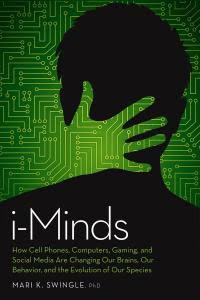Time spent in front of a screen is a double-edged sword: it’s how we connect with each other (do land lines even exist anymore?), but it can also be the source comparison, anxiety and depression.
In her new book, i-Minds: How Cell Phones, Computers, Gaming, and Social Media are Changing Our Brains, Our Behavior, and the Evolution of Our Species, Dr. Mari K. Swingle explores how exactly screen-based technology is changing our brains (hint: it’s not for the better) and practical steps we can take to mitigate the damage.
SDTC: What did you uncover that surprised you the most in doing research for your book?
It’s hard to surprise a therapist, but I suppose the biggest surprise was that there is a much larger than I expected community of single people who live their lives almost entirely online. They work on screens, play (AKA game) on screens in solitary or group gaming MMORPs (Massive Multiplayer Online Role Playing games), socialize in gaming and chat rooms like Reddit, shop on screens, and conduct their sex lives on screens with cybersex, solitary porn viewing, and masturbation. They also order a lot of take-out (home delivery of course).
Some are ironically well-adjusted, while others are in complete “failure to thrive” mode. Claiming depression or dysfunctional anxiety, they are essentially sitting in apartments gaming, watching a lot of porn and and otherwise driving their families nuts. Many find themselves unhappy yet unable to disengage.

How does screen time affect babies? Children? Adults?
For babies, screens affect development at its core. All systems (emotional, social and cognitive) first wire though parent-child interaction (such as touch and voice), followed by observation and interaction with the environment – touching, observing, and listening. When babies are placed in front of screens, they are not touched, spoken to, sung to, cooed or talked to as much. They also do not listen to or observe their environment (i.e., the voices or sounds around them that are not coming from the screen).
This is problematic, as screens cancel out other information that babies are designed to learn from and, in turn, the brain systems that are supposed to wire don’t, or they wire differently. One study found that for every hour babies watch a screen, they learn six to eight words less than babies who are not watching. Another found that babies learn absolutely no vocabulary when presented by a person on a screen whereas they do learn when presented by a person live interacting with them.
They do appear to enjoy screens though, and unfortunately the industry is promoting babies being mesmerized, giggling or bopping along, or otherwise interacting with screens as positive or healthy – when nothing supports this claim. Babies who settle with screens (as opposed to being held, cooed or sung to) will also tantrum more without screens when older. So you are essentially setting them up to relate more to technology than people and to need screens to feel good – and that frightens us therapists.
Problems arise when children are exposed to screen-based technologies too early, too much, and without alternate. A good rule to follow: if you do not want to negatively affect development, introduce screens after the age of six. When integrated appropriately, technology has much to offer. It ain’t all bad, but we need to be wise about timing and purpose.
For adults, excessive screen use is highly associated with the development of anxiety, depression, obsessive-compulsive behaviour and chronic insomnia. Again, the key word is excessive; balanced usage is fine and arguably has many, many positives.

Dr. Mari K. Swingle
Should we be concerned about how much time we spend in front of a screen? If so, what should be the cap?
Yes, amount of time spent on screens is critical. And it is not just the time one is actively on screens (e.g., searching, viewing, chatting and such). It is also the portion of our time we are ‘on call’ (i.e., attending to the bing or ding of texts, FB, Twitter, messenger, email). I conservatively recommend that for every hour you are on screens (after work hours) you should be off for at least 1.5 hrs. Many of us, however, now find we can’t. When we are offline or disconnected we feel bored, restless and agitated. This is the larger problem; screen usage arouses us so we need higher levels of stimulation to feel ‘well.’ It is a horrible Catch-22.
While mediated, social interactions can bring us together through Facebook, Twitter, Pokémon Go etc. They can also be harmful to our well-being; are there ways to mitigate this?
Studies, mine included, have found the more you engage with social media specifically, and i-tech in general, the more you are at risk of depression (and agitated depression). The pattern is: you feel a little lonely, a little bored, or a little curious, so you go online or follow social media. Then, when you remove yourself, you feel empty, restless, or alone – so you go back on screens to alleviate these feelings. It is a vicious cycle.
The answer here fortunately is simple. Enjoy a little social media, and then engage more with real people face-to-face and heart-to-heart. Go for a hike, have a chat over a coffee, a sandwich or a beer, and check your phone only intermittently or not at all while sharing company. It is very healthy to regularly turn devices to silent (not vibrate) and be fully present with others. And never bring your phone to bed! Your system will never quiet if screens are the first and last thing you do, never mind reducing intimacy for those of you in relationships.



 Follow Us On Instagram
Follow Us On Instagram
